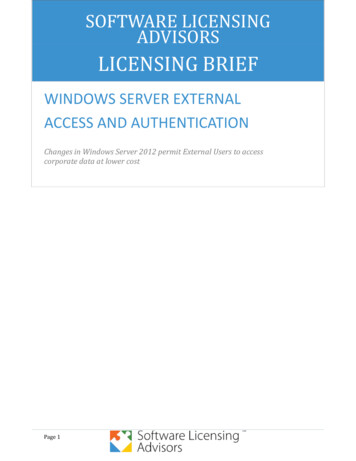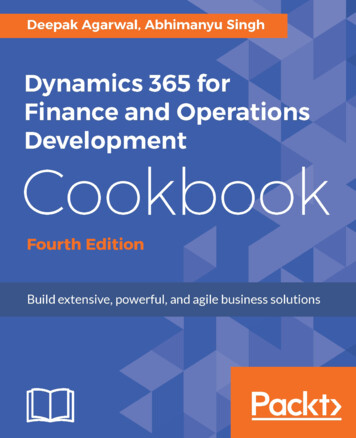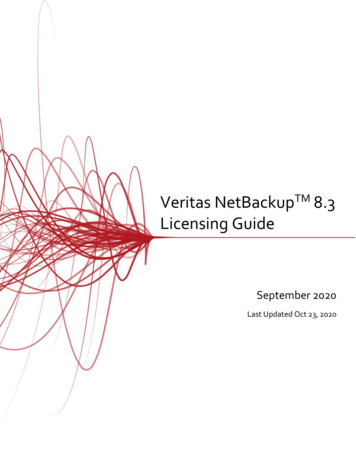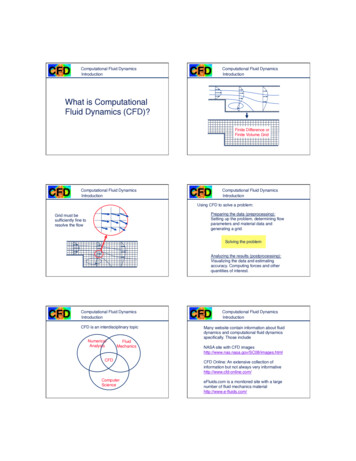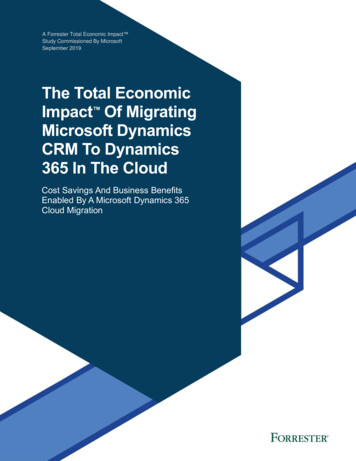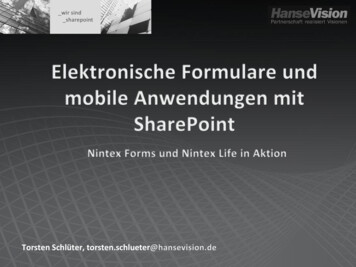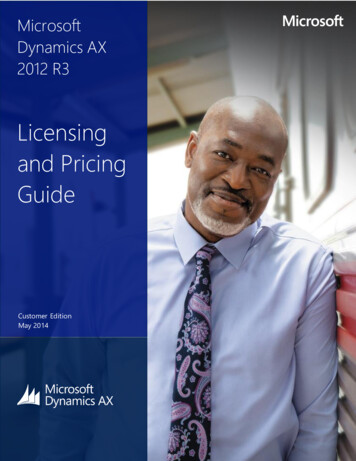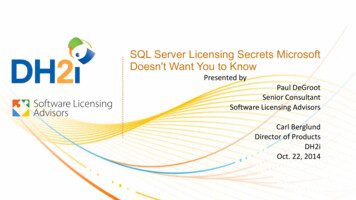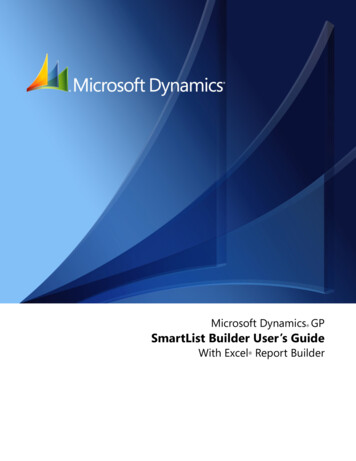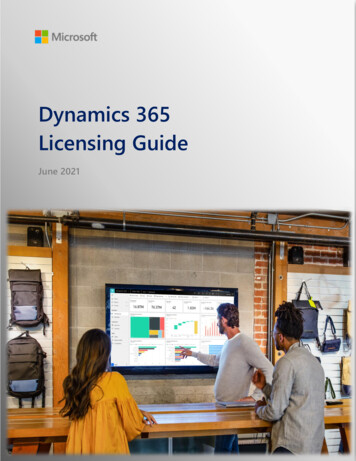
Transcription
Dynamics 365Licensing GuideJune 2021Dynamics 365 Licensing Guide October 2020
Using This GuideUse this guide to understand how to license Microsoft Dynamics 365 intelligent business applications. Youhave a variety of options to suit your situation. Whether you need one Dynamics 365 application or many, theycan be easily and independently deployed so you can start with what you need and easily adopt additionalcapabilities as your business demands.To improve the readability of this document, we’ve shortened product names throughout to exclude“Dynamics 365.” If you’re ever uncertain, see the complete list of full and shortened Dynamics 365 names inAppendix A.The Contents page shows how this document is structured, with an overview followed by details organized byproduct. The licensing section for each Dynamics 365 product includes information about: The specific applicationRelated or add-in applications and capacity that may be licensed with itUse rightsTo easily maneuver between sections, simply click the TOC symbol (to the Contents page.) at the end of each section to returnOther resources you may needThis document is about Dynamics 365 licenses, but it is not a legally binding licensing rights document. It alsodoes not supersede or replace any legal documentation covering use rights. To understand conditions onlicense acquisition, product-specific terms, and conditions governing how Microsoft products can be used inMicrosoft volume licensing programs, review the complete Product Terms and Licensing Terms.A complete list of product features and capabilities is available in technical documentation at MicrosoftDynamics 365 documentation Microsoft Docs. You can also search for in-depth articles and find helpfulinformation about licensing provisioning and licensing administration at Microsoft Docs.For help determining the right technology solution for your organization, including the license requirementsfor a specific product or scenario, talk to your Microsoft account team or your Dynamics Certified Partner.Microsoft reserves the right to review or update this document at any time without notice.This document does not apply to Microsoft Dynamics on-premises solutions; the Microsoft DynamicsCRM Online service; or the Microsoft Dynamics AX online service. Appendix H provides links to theapplicable licensing guides for these other products, which include details on entitlements and use rights andthe benefits derived from Dynamics 365 licenses.What’s new in this licensing guide?This licensing guide was updated to reflect licensing updates and new online service offerings as of June 2021.See Appendix I: Change Log for more details.Dynamics 365DescriptionDynamics 365 Licensing Guide June 2021New Offer or Change No new offers in June 2021P a g e 1
ContentsHow to Buy Dynamics 365 . 3Dynamics 365 Licensing Overview . 3Assigned licenses . 3Full user access licenses . 4Additional user access licenses . 5Unassigned Licenses. 6Full application access licenses . 6Cross-application access licenses . 6Capacity licenses. 6Assigned Application Licensing . 6Dynamics 365 Business Central . 7Dynamics 365 Commerce . 9Dynamics 365 Customer Service . 12Dynamics 365 Field Service . 15Dynamics 365 Finance . 17Dynamics 365 Guides . 19Dynamics 365 Human Resources . 19Dynamics 365 Project Operations . 21Dynamics 365 Remote Assist . 23Dynamics 365 Sales .24Dynamics 365 Supply Chain Management. 27Unassigned Application Licensing . 31Dynamics 365 Customer Insights. 31Dynamics 365 Customer Voice . 31Dynamics 365 Electronic Invoicing . 32Dynamics 365 Fraud Protection . 32Dynamics 365 Marketing . 33Cross-Application Licensing . 36Assigned licenses .36Device licenses . 36Human Resources Self Service license . 37Operations – Activity license. 37Team Members licenses . 37Unassigned licenses. 38Operations – Order Lines license. 38Capacity licenses .39Default subscription capacity . 39Capacity add-ons . 41Additional Licensing Requirements . 42Minimum license purchase requirements .42Licensing requirements for external users .42Multiplexing .43Dual use rights .44Dual write .45Dynamics 365 extensibility .45Appendix A: Dynamics 365 Licenses . 46Appendix B: Definitions . 47Appendix C: Dynamics 365 Team Members Use Rights Overview . 49Appendix D: Custom Tables (formerly known as ‘Entities’) . 51Appendix E: Security Role Assignment, Implementation Concerns, and Customization Licensing . 52Appendix F: Operations – Activity Approval Privileges . 55Appendix G: Trials and Service Support . 57Appendix H: Additional Resources . 58Appendix I: Change Log . 59Dynamics 365 Licensing Guide June 2021P a g e 2
How to Buy Dynamics 365If you’re ready to conquer emerging business challenges with a next-generation ERP and CRM solution, you’rein the right place. Depending on your situation and geographic location, there are several ways to buyDynamics 365, including volume licensing agreements and through certified reseller partners. This guidedefines standard licensing options, and the benefits they confer, generally and for specific Dynamics 365products. To learn more about volume licensing or to find a reseller, visit the Microsoft Volume Licensingwebsite. For details about volume licensing options, including Online Services terms, refer to Product Terms.Find Dynamics 365 country, language, and localization availability here.Note that for Dynamics 365, mixing licenses across different licensing programs—for instance, using a volumelicensing agreement for one product and a license bought through a reseller partner for another—on a singletenant is not recommended and could lead to incompatible subscriptions. Microsoft Products and ServicesAgreement (MPSA) licenses may be mixed with Enterprise Agreement (EA) licenses, however, for short-termpurposes.Dynamics 365 Licensing OverviewDynamics 365 applications are licensed by subscription in two broad categories: Assigned licenses, which include:o User licenses, which grant access for a named user, regardless of the device used. Forproducts that offer licenses for both enterprise and professional levels of functionality (such asSales), user licenses may be referred to as Enterprise licenses or Professional licenses. Note,however, that an organization may not install both versions in the same environment.o Device licenses, which grant access via certain devices, using either assigned or shared logins.Unassigned licenses that provide access to a feature or service at the tenant level, regardless of theuser or device involved.o Options include full application access, cross-application access, and additional capacity forcomponents, such as storage, that may be subject to capacity limits.Assigned LicensesUser accessThe functionality of a single Dynamics 365application. May be full access or additional useraccess, such as with the Team Members license.Unassigned LicensesFull product accessCross-application accessDevice accessVia shared or assigned loginsAdditional capacityAn organization may have both assigned and unassigned licenses. Details about each type are below.Licenses grant users non-perpetual rights (with no buy-out rights) to the use of one or more specific Dynamics365 products in the cloud (not on-premises). As long as your subscription payments are up to date and youadhere to the Product Terms, you will have access to the current licensed Dynamics 365 product.Admins do not need any license to configure and administer Dynamics 365 applications.Note: It’s easiest to determine the licensing that’s right for you if you understand a few related terms, such asuser licensing and tenant licensing. If you’re not already familiar with them, please see Appendix B.Assigned licensesAssigned licenses give a named user or dedicated shared device access to specific products. Full-access userlicenses are the most common, but assigned licenses include several options for additional users, usually withlimited functionality.Dynamics 365 Licensing Guide June 2021P a g e 3
Full user access licensesFull users are those whose work requires the full, feature-rich functionality of Dynamics 365, whether in a largeorganization with Enterprise licenses or a small company with a Professional license. Enterprise andProfessional licenses may not be mixed.Several products are also available with standard and enhanced levels of functionality, such as Sales Enterpriseand Sales Premium. The licenses for these products indicate which functionality level has been purchased.Note that Business Central (Essentials or Premium) stands alone. Reference the Business Central section forexceptions.Base licenses and cost savings opportunities for “attach” licensesMicrosoft provides a cost-effective way for a single Dynamics 365 user to obtain full user licensing for multipleproducts. Licenses for products that provide core business functionality qualify as base licenses. (See the tablebelow.) Each has one or more additional applications that are frequently used by people in the same roles andthat qualify as “attach” licenses for that user. (These are sometimes referred to as subsequent qualifyingapplications.) To take advantage of the special attach license pricing:1.2.3.Buy the first base user license at standard pricing.Review which attach licenses are available for that base. (See the qualifying products for each baselicense below.)Buy attach licenses for the same user at an attach license price. You may buy as many attach licenses asare available for that base license.Every full user must have a base license, though the base licenses don’t need to be for the same product. (Forinstance, an attach license for Customer Service Professional is available both for a user with a Finance baseand another with a Commerce base.)Base applications and their qualifying products for attach licensingDynamics 365 attach licenses per user SCM Sales ProSales EntRAProj Oper.HRFinanceField SvcCS ProCS EntBusiness Central EssentialsBusiness Central PremiumCommerceCustomer Service Enterprise (CS)Customer Service Professional (CS)Field ServiceFinanceGuidesHuman Resources (HR)Microsoft Relationship Sales solution Plus (MRSs Plus)Project Operations (Proj Oper.)Remote Assist (RA)Sales EnterpriseSales PremiumSales ProfessionalSupply Chain Management (SCM)CommerceDynamics 365 base licenses per user If you require multiple products on the base licenses list, you may buy as many qualifying attach licenses asyou need at an attach license price.Attach licensing detailsOnly assigned user licenses (not device licenses or unassigned licenses) may be bought as an attach license.Tenant-based licenses (for Fraud Protection, for instance), additional access licensing, and capacity licensing doDynamics 365 Licensing Guide June 2021P a g e 4
not qualify for attach licensing pricing but may be licensed separately. Some specialized Dynamics 365products (such as Guides) also are not eligible.Note: System administrator will not be able to assign an attach license to a user who does not have therequired base license.Customers who obtain licensing through an Enterprise Agreement and who accidentally buy an attachlicense—when a base license is required—may step-up to the appropriate base license as needed. Customerswith licensing through the Cloud Solution Provider (CSP) or MPSA programs would need to return the attachlicense and buy the appropriate base license instead.Additional user access licensesAdditional users often represent a large percentage of the total users in an organization. They may consumedata or reports from line of business systems; complete light tasks like time or expense entry and HR recordupdates; or use the system more heavily without requiring full user capabilities. Additional users may access allthe functionality of the respective Dynamics 365 product within the constraints described below.Several different types of additional user license are available, all priced per month. The minimum durationrequirement for each (such as a minimum 12-month commitment, for example) is determined by the licensingprogram. You must buy at least one full user license to buy additional user licenses. Device license: With a device license for a specific Dynamics 365 application, any number of unlicensedusers can access the product through the licensed device. Device licenses may use shared logins (suchas “Warehouse Computer” and a shared password) or individual logins (each user’s personalcredentials), depending on the application and license:ooShared logins are available for Sales Device, Customer Service Device, Field Service Device,Operations – Device, and Business Central Device licenses. Note that when individual users sharea login, their individual usage cannot be tracked.Individual logins are available for Operations – Device and Business Central Device licenses (withno separate user license required). Human Resources Self Service license: This license, assigned to a single named user, enables the userto manage their own basic HR activities (such as time entry or benefits look-up) without a full userlicense for Human Resources. Operations – Activity license: This named user license is intended for additional users who requiremore capabilities than the Team Members license, but do not require the use rights of a full user. Team Members license: This license, also assigned to a named user, is for users who are not tied to aparticular function but require read-only access to certain data and basic Dynamics 365 functionalityfor designated scenarios such as expense entry or updating contacts.Users with a Team Members license can read Dynamics 365 data generated from Finance, SupplyChain Management, Commerce, Human Resources, Project Operations, Sales, Customer Service, andField Service. They may access a specific set of the functionalities of these products. The TeamMembers license does not provide access to custom applications. You have limited table (formerlyknown as ‘entity’) customization options for Team Members, read more about custom tables inAppendix D. Business Central Team Members license: This license, assigned to a named user, provides read-onlyaccess to certain data and functionality in Business Central deployments.Dynamics 365 Licensing Guide June 2021P a g e 5
Unassigned LicensesUnassigned licenses provide tenant level access to Dynamics 365 applications and resources. They are notassigned to specific users or devices.Full application access licensesThese licenses are the primary licensing mechanism for certain products, such as Dynamics 365 Marketing,Fraud Protection, and Customer Insights, which are only licensed per tenant.Cross-application access licensesCross-application licenses, such as the Operations – Order Lines license, may be used to provide access tosome Dynamics 365 applications in some situations as a supplement or alternative to assigned user access.Capacity licensesThe subscriptions for many Dynamics 365 products come with capacity entitlements or allowances, such as fordata storage, transaction volume, case routing requests, or customer profiles, for instance. The exactentitlement depends on the specific product and licensing agreement. Capacity add-on licenses provide moreflexibility for those components subject to capacity limits but needed to support a product. Default subscription capacities leverage the same tenant and infrastructure and accrue across thesingle tenant. Dataverse (formerly Common Data Service) capacities are shared between the followingproducts: Sales, Customer Service, Field Service, Finance, Supply Chain Management, Commerce,Human Resources, Project Operations, Remote Assist, Guides, Business Central Essentials, and BusinessCentral Premium. Database and file storage capacities (as distinct from the Dataverse capacities) areshared between only a few products: Finance, Supply Chain Management, Commerce, HumanResources, and Project Operations. Capacity add-on licenses, which apply across a single tenant, are not associated with a specific user.Additional capacity can be bought at any time and remains a part of the subscription for the remainderof the subscription term. Capacity licenses require a minimum of a one-year subscription commitment with annual allowancesfor the entitlements (such as the number of allowed transactions). The annual allowance applies evenfor capacities that are allotted per month. For instance, an annual subscription that provides a total of36K transactions is licensed at 3,000 transactions per month for 12 months, but those transactions canbe consumed at any point in the year, including all in one month. For instance, a seasonal businesswould be able to use its allowance in six months at a rate of 6,000 transactions per month.Note: As with other Microsoft products, add-on licenses are available only to customers with valid(paid) base licenses. Capacity add-ons may not be purchased for unpaid licenses such as demo/dev orInternal Use Rights (IUR) licenses.Because assigned licenses are the primary licensing approach for most Dynamics 365 products, the remainderof this guide presents assigned licensing information for each application that uses it, followed by unassignedlicensing options.Assigned Application LicensingAssigned licenses provide user or device access to Dynamics 365 products. Licenses for some products areavailable for different levels of functionality known as Professional, Enterprise, and Premium. Enterprise licensesare the standard; Professional licenses offer streamlined functionality for smaller businesses or less complexneeds; and Premium licenses provide additional functionality.While the Enterprise and Professional designations are primarily intended to distinguish between the completefunctionality required by larger organizations and more cost-effective support for small or medium-sizedDynamics 365 Licensing Guide June 2021P a g e 6
businesses, these licensing options may also provide more flexibility for organizations deploying Dynamics 365across multiple environments. Enterprise licenses are appropriate for users such as salespeople, customer service representatives,finance employees, controllers, human resources, and supply chain managers typically need the mostextensive access and most advanced functionality. Enterprise licenses are available for these Dynamics365 products: Sales Enterprise, Customer Service Enterprise, Field Service, Human Resources, Finance,Supply Chain Management, Commerce, Project Operations, Remote Assist, Guides, Business CentralPremium, and Business Central Essentials. Professional licenses suit users whose work scenarios are generally less complex and who needstreamlined capabilities.Note that enterprise and professional users may not be deployed in the same environment. That meansmost customers will want enterprise or professional licenses, but not both.Dynamics 365 Business CentralBusiness Central connects teams across your business with tools to help them work more efficiently,collaborate better, and respond more quickly to changes to meet your business goals. Business Central is acomplete standalone solution that does not fully operate with all the Dynamics 365 products. Exceptions beingyou may purchase Customer Service Professional attach and/or Sales Professional attach user licenses.Marketing and Fraud Protection, tenant-based licenses, are also available for Business Central users.Business Central, licensed by assigned user, is available with Essentials or Premium levels of capabilities. Youmay license users either with an Essentials license or a Premium license, but not both. Business Central EssentialsBusiness Central Essentials provides a wide range of operational and management capabilities, including: Financial ManagementAI-Supported ForecastingCustomer Relationship ManagementE-Services Human Resources ManagementProject ManagementSupply Chain ManagementWarehouse Management and InventoryBusiness Central Essentials capabilitiesFinancial ManagementAccount SchedulesAllocationsBank Account ManagementBank ReconciliationBasic General LedgerCost AccountingBasic XBRLBudgetsCash Flow ForecastCheck WritingConsolidationDeferralsElectronic Payment/Direct Debits1Fixed AssetsMultiple CurrenciesPayment HandlingAdvanced Financial ManagementIntercompany PostingsResponsibility CentersUnlimited DimensionsArtificial Intelligence2Cash Flow ForecastLate Payment PredictionImage RecognitionInventory ForecastSales ForecastCustomer Relationship ManagementBusiness Inbox for OutlookContact ClassificationCampaign ManagementContact ManagementCampaign PricingEmail LoggingRelationship ManagementInteraction/Document Management Task Management3Dynamics 365 Sales Integration Opportunity ManagementE-ServicesBank Feeds (US, CA)Document Exchange ServiceDocument Management,Document CaptureDynamics 365 Licensing Guide June 2021Online MapTax. Reg. No. Validation Service (EU)1PayPalHuman Resources ManagementP a g e 7
Basic Human ResourcesProject ManagementProject Management JobsTime SheetSupply Chain ManagementAlternative Order AddressesItem AttributesPurchase InvoicingAlternative Ship-To AddressesItem BudgetsPurchase Line DiscountingAlternative VendorsItem CategoriesPurchase Line PricingAssembly ManagementItem ChargesPurchase Order ManagementBasic InventoryItem Cross ReferencesPurchase Return Order ManagementBasic PayablesItem SubstitutionsRequisition ManagementBasic ReceivablesItem TrackingDemand ForecastingCalendarsLocation TransfersSales Invoice DiscountsCycle CountingMultiple LocationsSales InvoicingDrop ShipmentsOrder PromisingSales Line DiscountingWarehouse Management and InventoryAutomated Data Capture System Internal Picks and Put AwaysWarehouse ShipmentBin Set-UpPickWarehouse Management SystemsOther CapabilitiesAnalysis Reports
This licensing guide was updated to reflect licensing updates and new online service offerings as of June 2021. See Appendix I: Change Log for more details. . Buy attach licenses for the same user at an attach license
